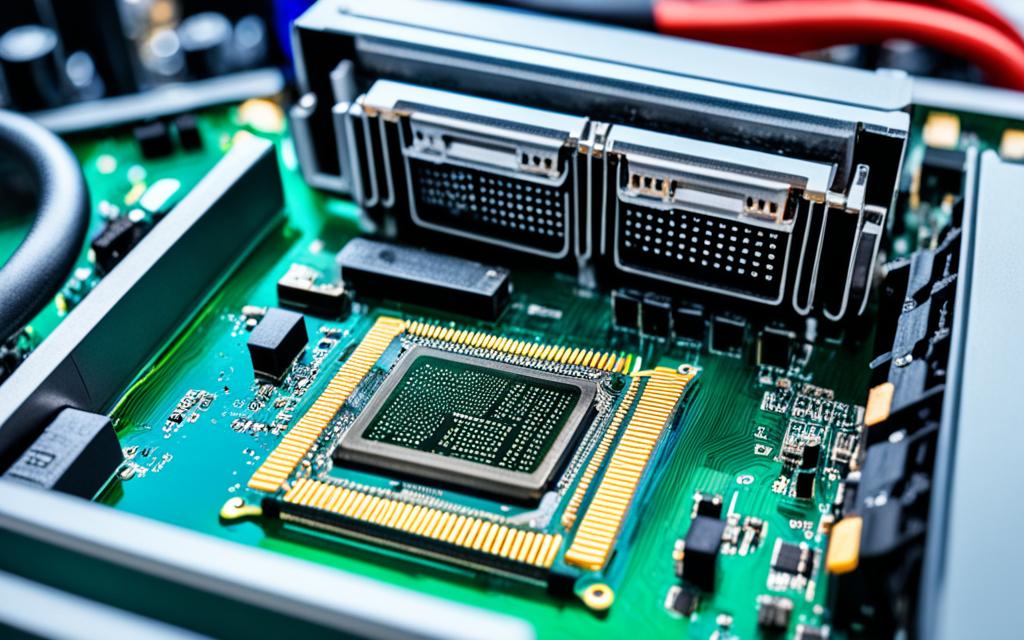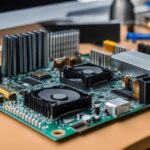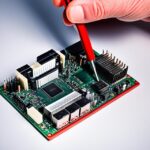Table of Contents
Knowing if your CPU is overclocked is key to ensuring it runs well. You can spot this by seeing if it runs faster than it should. There are tools and signs that help with this. Today’s higher clock speeds make computers work faster, boosting their performance. But, overclocking can risk your computer overheating or becoming unstable. So, understanding if your CPU is overclocked helps keep your computer in top shape.
For a closer look at CPU speeds, tools like CPU-Z and MSI Afterburner are handy. They make it easier to check how fast your CPU is. Learning about overclocking opens up ways to improve performance but also shows the need for a stable system. For further information, check out this guide: how to determine if your CPU is.
Key Takeaways
- Overclocking raises CPU speeds for better performance.
- There are many tools to help find if a CPU is overclocked.
- Keeping an eye on temperatures is crucial to avoid overheating.
- Sometimes, you might need to reset to default settings for safety.
- Be careful, as overclocking might void your warranty.
Understanding Overclocking and Its Implications
Overclocking is a technique to boost a CPU’s power beyond what’s recommended. This approach offers great overclocking benefits that gamers and tech enthusiasts find enticing. However, it’s crucial to understand both the potential gains and the risks involved in overclocking.
What Is Overclocking?
The term overclocking definition means increasing your computer’s CPU or RAM speed to get better performance. Nowadays, there’s a rivalry between Intel and AMD regarding overclocking. Intel’s newer processors, like Alder and Raptor Lake, are great for overclocking. On the other hand, AMD’s Ryzen 7000 series focuses more on automatic overclocking, offering minimal manual adjustments. Take the Ryzen 9 7950X3D for example, showing the progress in overclocking technology1.
However, overclocking can cause more heat and use more power. This changes how a CPU acts when it’s working hard2.
Benefits and Risks of Overclocking
Benefits of overclocking include improved system performance, especially for better gaming and faster computing. Yet, the risks of overclocking can’t be ignored. It might void warranties and reduce component lifespan due to extra heat and voltage. To lower these risks, it’s vital to keep CPU temperatures under 25 degrees Celsius3.
The Differences Between Factory Settings and Overclocked Speeds
There’s a big difference between factory settings vs overclocked speeds. Original settings are stable and keep your warranty safe. Overclocked settings, however, can significantly boost performance but might reduce stability. It’s important to think about what you need and what your hardware can handle before making a choice.
Signs That Your CPU Might Be Overclocked
To find out if your CPU is overclocked, look for key signs. Unexpected performance boosts and more heat can show this. Such signs may mean your system is unstable if not managed right.
Unexpected Performance Gains
Applications might run faster than you think, revealing your CPU could be overclocked. Tasks finishing quickly or beating benchmarks are clues. This extra speed is what PC fans often seek for better gaming and app use. But, too much speed might mean the CPU is overworked, which is risky.
Increased Heat Output and System Stability
Higher clock speeds make a CPU hotter. Watch out for signs like sudden shutdowns or crashes. Bad cooling can make this worse, risking hardware damage. When overclocking, it’s vital to have good cooling to avoid failures. Slow overclocking helps keep an eye on temperatures and stability.
If you need to fix power issues, visit this source. It has helpful advice.
Watching these signs helps keep your gear lasting longer and running stable. Not paying attention can harm performance and cause failures456.
How Can I Tell If My CPU Is Overclocked
Figuring out if your CPU is overclocked can boost your computer’s work and life. This is true especially for those using demanding software. There are different ways to check your CPU’s clock speeds and how well it performs. Knowing how to use these tools is key for beginners and experts alike.
Using Task Manager for Quick Checks
The Task Manager in Windows lets you quickly see your CPU’s performance. Just go to the Performance tab to check your CPU’s clock frequency. This quick look is easy but might not show everything that more advanced tools can.
Tools to Monitor CPU Performance: CPU-Z and Others
CPU-Z and similar tools offer a deep dive into your CPU’s details, like core speeds and voltages. They help you watch important features all the time. With CPU-Z, you get to see your CPU’s speed in real-time and compare it with the standard specs. This helps you understand if your CPU has been overclocked.
Checking BIOS Settings for Clarity
To really be sure if there’s overclocking, check the BIOS for its settings. As your system starts, enter the BIOS/UEFI to look at the CPU’s settings. This gives a full picture of any changes from the default. Knowing your BIOS setup helps you make good choices later on.
Benchmarking Your CPU for Confirmation
Benchmarking is crucial for checking your CPU’s performance, both before and after overclocking. It helps create a performance baseline. This shows how adjustments affected your CPU. Testing before overclocking is important to identify possible improvements.
Importance of Benchmarking Before Overclocking
Understanding the value of benchmarking your CPU is key before you overclock. By testing its current state with CPU benchmarking tools, you discover what your chip can really do. These tests give insight into how well your system handles increased speeds. This helps you see if boosting your CPU is a good idea.
Popular Benchmarking Tools to Use
There are many trusted tools for benchmarking. Geekbench and Cinebench stand out for their precise performance tests. Using such CPU benchmarking tools provides detailed data on performance. This information is crucial for knowing your CPU’s limitations and making it better. These tools are favoured because they show how CPUs perform in real situations. This is very useful for anyone thinking about overclocking.
Check your power supply unit (PSU) before overclocking. Your CPU needs sufficient power for stable performance7. Doing benchmarks helps you adjust your system safely. It prepares you to boost your CPU’s performance wisely. This makes for a safer and more effective overclocking experience.
For great tips on building a PC and picking parts, here’s a detailed guide. It explains the importance of components like the CPU and RAM89.
Restoring Default Settings for Safety
Resetting overclock changes keeps your CPU safe and avoids damage10. You must follow specific steps for the safe CPU setting. It’s also key to use the right cooling systems for CPUs.
How to Safely Revert Overclocking Changes
To go back to default settings, enter your computer’s BIOS10. Look for the CPU performance section and choose to reset settings. This action prevents overheating and decreases the chance of system issues.
Intel® XTU is helpful software. It lets you watch and change clock speeds easily11.
Understanding the Need for Cooling Solutions
Even with default settings, proper cooling is crucial. Overclocking makes extra heat that can harm your computer if not handled12. For computers used a lot, a strong cooling system is needed11. It keeps the performance good and helps your components last longer.
Risks Associated with Reverting Settings
Going back to original settings can reduce how fast your computer works. This might affect tasks that need a lot of processing power10.
But, your system will be more stable. Yet, it might not handle many tasks at once or work well with apps that use a lot of resources. It’s important to know this when changing CPU settings.
Conclusion
As we end our summary on CPU overclocking, it’s key for enthusiasts to understand its effects on performance. By keeping an eye on CPU performance and benchmarking carefully, you can improve your system’s power while keeping it safe.
Our talks showed that overclocking can boost performance by about 16.7%. But, it also brings risks like higher energy use and possible damage if not done right1314. Proper cooling and a careful approach are crucial, especially for newcomers.
So, the takeaway on CPU overclocking is this: use the knowledge here wisely. It can enhance your computing experience by increasing both potential and performance. It’s about more than speed. It involves knowing the key elements for a stable and efficient system.
FAQ
How can I tell if my CPU is overclocked?
Check if your CPU is overclocked by looking at its speed. Use Task Manager or CPU-Z for this. Also, check your BIOS settings for any speed changes.
What are the main benefits of overclocking my CPU?
Overclocking boosts your CPU’s performance, especially in games and demanding tasks. This leads to better system response and more frames per second. But, remember that it needs good cooling and careful monitoring.
What risks should I be aware of when overclocking my CPU?
Overclocking can cause overheating and make your system less stable. It might even shorten your hardware’s life. Use good cooling and test thoroughly to avoid these risks.
How do I monitor the performance of my CPU effectively?
Use monitoring tools like CPU-Z or HWMonitor to check your CPU’s performance. Benchmarking tools, like Geekbench, help too. They show how your CPU performs before and after overclocking.
What signs indicate that my from the CPU might be overclocked?
Signs your CPU might be overclocked include stronger performance, more heat, and random system crashes. These can happen during heavy use.
How can I revert my CPU settings back to their default configurations?
To reset your CPU, go into the BIOS menu and pick the default settings. Watch your temperatures and performance to make sure everything works correctly. Wrong settings can overheat or damage your hardware.
Why is benchmarking important before and after overclocking?
Benchmarking lets you measure your CPU’s speed before and after overclocking. It helps see if overclocking has improved your system or made it slower.
What role do cooling solutions play in overclocking?
Cooling is key when overclocking. It handles the extra heat to keep your CPU stable. This prevents overheating and can make your CPU last longer.
Source Links
- https://www.tomshardware.com/how-to/how-to-overclock-a-cpu – How to Overclock Your CPU: Get the Most GHz from Your Processor
- https://www.digitaltrends.com/computing/how-to-overclock-your-cpu/ – How to overclock CPU safely with XTU, Ryzen Master, or BIOS | Digital Trends
- https://www.crucial.com/articles/about-memory/what-is-overclocking – What is Overclocking? Examining Pros and Cons
- https://www.malwarebytes.com/cybersecurity/computer/what-is-overclocking – What is Overclocking? | Malwarebytes
- https://softwareg.com.au/blogs/computer-hardware/how-to-know-if-i-can-overclock-my-cpu – How To Know If I Can Overclock My CPU
- https://www.overclock.net/threads/how-can-i-tell-if-my-cpu-mobo-is-damaged-from-overclocking.490305/ – How can I tell if my CPU/mobo is damaged from overclocking?
- https://www.xda-developers.com/how-to-overclock-cpu/ – How to safely overclock your CPU: A beginners guide to unlock more performance
- https://blog.szynalski.com/2012/11/the-right-way-to-stress-test-an-overclocked-pc/ – The right way to stress-test an overclocked PC « Hope This Helps
- https://www.overclock.net/threads/mandatory-1-000v-cpu-clock-speed-competition.1794298/ – Mandatory 1.000v CPU clock speed competition
- https://www.avg.com/en/signal/how-to-overclock-cpu – Overclocking Your CPU: A Step-by-step Guide
- https://www.jawa.gg/blog/how-to-stop-cpu-overclocking/ – How to Stop CPU Overclocking
- https://www.intel.com/content/www/us/en/gaming/resources/how-to-overclock.html – How to Overclock Your Unlocked Intel® Core™ Processor
- https://ibertronica.es/blog/en/news-en/unlocking-your-pcs-potential-everything-you-need-to-know-about-overclocking/ – Overclocking. Everything you need to know about him.
- https://en.wikipedia.org/wiki/Overclocking – Overclocking












